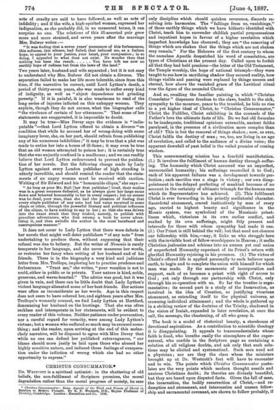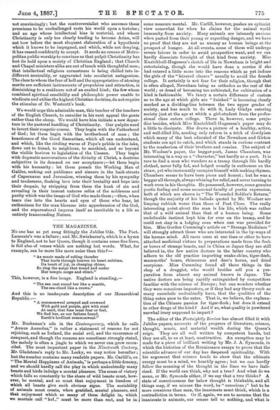CHRISTUS CONSUMMATOR.*
Da. WESTCOTT is a spiritual optimist: in the shattering of old beliefs, the non-fulfilment of Scripture promises, the moral degradation rather than the moral progress of society, he sees • Christua Consummator Some Aspects of the Work and Person of Christ in Balatiou to Modern Thought. By B. F. Weetcott, nix, Regius Professor of Divinity, Cambridge. Loudon : Macmillan and Co. 1855.
only discipline which should quicken reverence, discords re- solving into harmonies. The "fallings from us, vanishings," of those earthly things which we have hitherto identified with Christ, teach him to surrender childish partial prepossessions and impatient hopes in favour of a higher revelation which imperfect knowledge has obscured; they are "the removing of things which are shaken that the things which are not shaken may remain." For the Hebrews of the first century to whom the nameless Apostle despatched his word of consolation, are types of Christians at the present day. Called upon to forfeit all that they had held precious—the letter of the Old Testament, the Temple worship, the hope of national triumph—they were taught to see how in sacrificing shadow they secured reality, how things visible and passing were replaced by things unseen and eternal, how above the vanished grace of the Levitical ritual rose the figure of the ascended Christ.
And so, recalling the familiar painting in which "Christen Consolator " dispenses freedom to the slave, health to the sick, sympathy to the mourner, peace to the troubled, he bide us rise to a yet higher ideal of Christ, to "Christus Consummator," Christ the Fulfiller, Christ exhibiting in the counsels of the Father's love the ultimate facts of life. Do we feel old formulas to be inadequate, traditional opinions untenable, ancient faiths paralysed, in the presence of a civilisation more complex than of old ? This is but the removal of things shaken ; now, as ever, Christ fulfils the destiny of man ; we, too, are living in an age of revelation, and called to the audience of a divine voice ; the apparent downfall of past belief is the veiled promise of coming wisdom.
This consummating mission has a fourfold manifestation. (1.) It involves the fulfilment of human destiny through suffer- ing. The humanity which Christ assumed was an imperfect, unreconciled humanity ; his sufferings reconciled it to God; each of his apparent failures was a development towards per- fection ; each sacrifice was a stage in victory ; our own disap- pointment in the delayed perfecting of mankind becomes of no account in the certainty of ultimate triumph for the human race which its Representative has achieved. (2). This fulfilment Christ is ever forwarding in his priestly mediatorial character. Sacerdotal atonement, craved instinctively by men of every age, carried to highest beauty and significance in the Mosaic system, was symbolical of the Messianic priest- liness which, victorious in its own earlier conflict, and exalted by its own sufferings, might fitly present and intercede for those with whom sympathy had made it one. (3.) Our Priest is still behind the veil; but that need not obscure our fellowship with him,—nay, it links us who struggle here with the invisible host of fellow-worshippers in Heaven ; it melts Christian jealousies and schisms into an unseen yet real union of unperfected Humanity expectant of its Priest's return with glorified Humanity rejoicing in his presence. (4.) The virtue of Christ's offered life is applied personally to each believer upon earth, to begin and to complete the union with himself for which man was made. By the sacraments of incorporation and support, each of us becomes a priest with right of access to God ; yet only through our partnership with Christ, only through his co-operation with us. So far the treatise is argu- mentative; its second part is a study of the Incarnation, as involved in the idea of Creation, as justifying vicarious atonement, as extending itself to the physical universe, as crowning individual attainment ; and the whole is gathered up in a striking review of the doctrine of the Trinity, shadowed in the vision of Isaiah, expanded in later revelation, at once the call, the message, the chastening, of all who grasp it.
The book is a model of rhetorical beauty, a storehouse of devotional aspirations. As a contribution to scientific theology it is disappointing. It appeals to transcendentalists whose faith is fixed, who breathe easily the atmosphere of the super- natural, who confide in the Scripture page as containing a solution of all religions doubts, and ask only that such solu- tions may be elicited and systematised. Such men need not a physician ; nor are they the class whom the ministers brought up at Dr. Westcott's feet will have to encounter and to win. The points which Christus Ooturummator postu- lates are the very points which modern thought assails and anxious Christians doubt ; its theories are divinely beautiful, but they are based upon disputed facts. Given the fall of man, the incarnation, the bodily resurrection of Christ,—and re- demption and atonement, and intercession and unseen fellow- ship and sacramental covenant, are shown to follow probably, if
not convincingly; but the controversialist who assumes these prernieses to be unchallenged rests his world upon a tortoise; and an age whose intellectual bias is material, and whose Christianity is only too clearly tending to become Arian, will not bow before the most eloquent elaboration of a hypothesis which it knows to be impugned, and which, while not denying, it has ceased confidently to accept. It needs no census of Metro- politan public worship to convince us that pulpit Christianity has lost its hold upon a moiety of Christian England; that Church and Chapel ministers alike are out of touch with thoughtful men; that intellectual religions earnestness is being chilled into in- different neutrality, or aggravated into secularist antagonism. The class to whom the fear of hell and the appropriation of atoning merits are sufficient instruments of propulsion and attraction, is diminishing to a residuum not of an exalted kind; the few whom combined spiritual sensibility and philosophic power enable to vindicate and utilise the highest Christian doctrine, do not require the stimulus of Dr. Westcott's book.
We would urge this admirable man, this teacher of the teachers of the English Church, to consider in his next appeal the goats rather than the sheep. We would have him initiate a new depar- ture in the pastoral handling of Christianity. Our pulpits need to invert their exegetic course. They begin with the Fatherhood of God; let them begin with the brotherhood of man ; the beneficence of the Good Samaritan, which all can understand, and which, like the circling waves of Pope's pebble in the lake, flows out to friend, to neighbour, to mankind, and so beyond the visible horizon to legislation of the Unseen. They begin with dogmatic asseverations of the divinity of Christ, a doctrine subjective in its demand on our acceptance ;—let them begin with his humanity let them preach the Working Man of Galilee, seeking out publicans and sinners in the back-streets of Capernanm and Jerusalem, winning them by his sympathy and tenderness, flashing love into their brutality and hope into their despair, by stripping from them the husk of sin and revealing in their inmost natures relics of the nobleness and purity which was the image of God who made them ;—then, when tears rise into the hearts and eyes of those who hear, let enthusiasm for the man blossom into apprehension of the God, and the supernatural impress itself as inevitable to a life so entirely transcending Nature.



































 Previous page
Previous page